Tassie’s small business survivors and thrivers
Although many Tasmanian businesses have struggled through the pandemic, there are also many local success stories. TasWeekend takes a look at the small business operators who have not only survived but thrived.
TasWeekend
Don't miss out on the headlines from TasWeekend. Followed categories will be added to My News.
Marie Van de Gumster was holidaying in the Galapagos Islands when the coronavirus pandemic began.
“The day I was meant to fly home, the world shut down,’’ she recalls.
She had spent the previous month sailing a boat from Panama to the Galapagos Islands, and had limited communication with her family in Tasmania.
Unable to fly home, Van de Gumster spent the next month sailing to Tahiti, where she was able to get on a plane which had been chartered by Mormons to take missionaries back to Salt Lake City in the US. From there she was able to secure a flight back to Australia and spent a month in quarantine before venturing into a strange new world where fellow Tasmanians – along with millions of others around the globe – were adjusting to life in lockdown.
And throughout all of this chaos and uncertainty, Van de Gumster was also trying to run her business, Summer Kitchen Bakery at Ranelagh.
“We did sort of prepare for the worst but we just managed to keep going,’’ she says.
“We always thought we may have to shut down at some point but we managed to stay open and keep trading … we just changed things and made it work.
Renovations are now underway to expand and upgrade the existing shopfront, cafe and kitchen, with Van de Gumster confident that the significant financial investment is worthwhile, despite the uncertainty of a global pandemic.
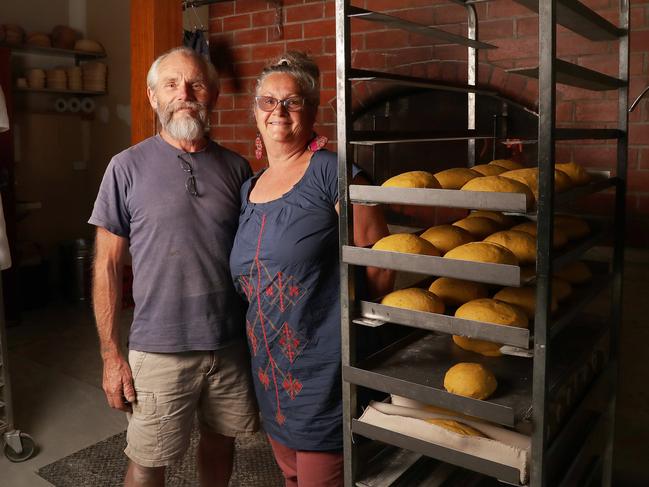
Many Tasmanian businesses have struggled through the pandemic, with some shutting up shop entirely or downsizing in a bid to stay afloat.
But there are also many businesses – like Summer Kitchen – that have not only survived this strange and uncertain time, but have thrived. Some are embarking on expansion plans, while others are employing additional staff, branching out into new markets and generally adapting to better cater for their customers, both online and in person.
University of Tasmania senior lecturer in marketing Louise Grimmer says it has been exciting to see so many success stories coming out of the pandemic in Tasmania, particularly in retail and services.
She says a fresh enthusiasm for shopping locally, along with the ability of Tasmanian small businesses to “adapt, pivot, be creative and resilient and really to do everything they could to survive” had resulted in positive outcomes. She says this seems especially true for businesses in regional areas as Tasmanians took the opportunity to get out and explore their own state while border restrictions were in place.
“The huge wave of support we saw for local businesses (following the pandemic) was really quite incredible and I believe that it will be a permanent shift,’’ Grimmer says. “We have so many fantastic local, small stores throughout Tasmania and the pandemic really shone a light on the importance of local businesses.
“One of the ways we could support our fellow Tasmanians was through trying to shop local whenever we could, and this shift is certainly holding firm as we move through 2022 and beyond.’
“Many businesses adapted their operations, developed new product and service offerings, started offering new customer services and really responded to customer needs. The combination of community support and business resilience resulted in many, many small businesses performing really well during the pandemic.”
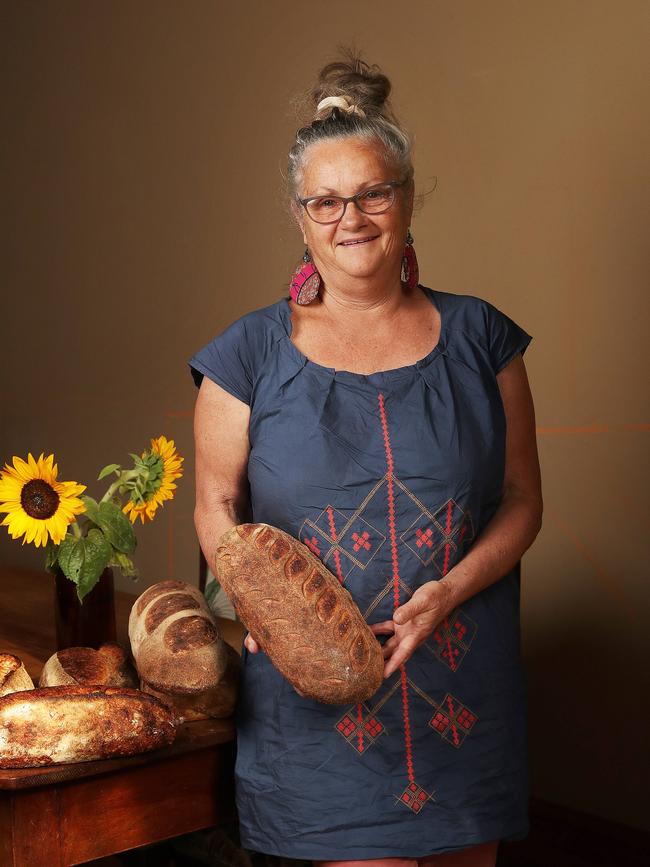
SUMMER KITCHEN BAKERY
All five of Marie Van de Gumster’s children grew up working in the Summer Kitchen Bakery, so when she became stuck overseas at the start of the pandemic, her children and her partner John Glendinning stepped up to ensure the business could continue to operate.
“It was a bit of a headache,’’ Van de Gumster confesses of being stuck so far from home. “But they just did what needed to be done and it was fine. The support of the local community was just fantastic.’’
As well as a bakery and cafe at Ranelagh, the business also has a wholesale arm, selling bread, pies and cakes to various cafes, restaurants and independent supermarkets, including Hill St Grocer.
The business also had a regular stall at Salamanca Market before the pandemic. But Van de Gumster has since put that on hold, as she would rather leave the space available for a business that relies solely on market trade.
The Lucaston resident says she is most proud of the fact she was able to keep all 30 of her staff throughout the pandemic.
“It was a priority for us to keep all our staff,’’ she says.
“That was the biggest thing that was on my mind, we had a responsibility to keep all these staff employed as they have families and mortgages. So we worked hard to make that happen. I thought maybe we’d have to put a whole lot of people off, it was the worst feeling in the world to tell you the truth.
“So we were pinching ourselves, honestly, all the time, just knowing that we were able to keep going and keep trading. And we were aware that for a lot of people that didn’t happen.’’
The business now has a website where customers can view menus and a list of stockists, and renovations are underway, allowing for an additional kitchen, another wood-fired oven, a bigger serving area to better cater for takeaway customers and slightly more seating for dine-in guests.
“It was always in the plan but I suppose Covid has just confirmed that we’re a place that people want to come to,’’ Van de Gumster says.
“We’ve been in business a long time (they bought the business 24 years ago and moved it from Lower Longley to Ranelagh, expanding from a wholesale-only business to a retail outlet in 2012).
“We feel confident about our business’s future in Tasmania. I actually feel really confident about the future.’’
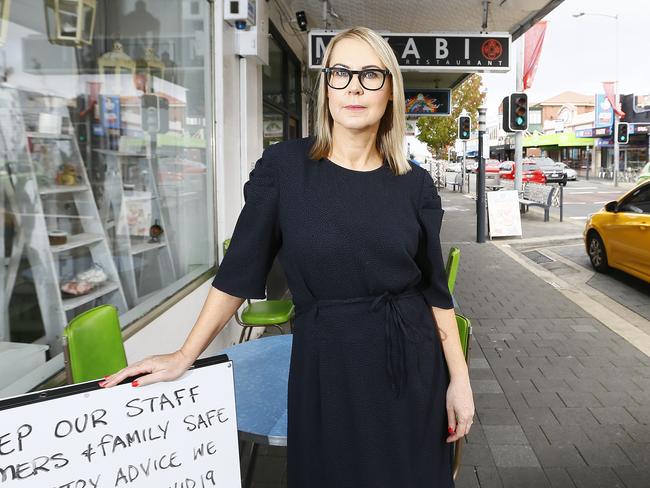
Meanwhile, Grimmer says it has been great to see rural towns such as Ranelagh enjoying such success during the pandemic.
“Certain areas have done really well and are performing really well – think about towns like Cygnet (most if not all the shops are occupied), Franklin and Ranelagh,’’ she says.
“There are many other areas outside the urban core. This could be partly because we spent time in lockdown travelling around Tasmania and discovering our own backyard – I think we have had a real renaissance around discovering the fabulous independent businesses around Tasmania that are often located in small towns. The popularity of farmers’ markets has also helped many people discover local growers and makers and this has had an impact on encouraging confidence in opening stores and outlets around the state.’’
THE SPOTTED QUOLL STUDIO
When Covid first hit, The Spotted Quoll Studio owner Tamika Bannister had nights where she would cry herself to sleep, unsure of what the future held for her small local business.
But in the two years since, her business has boomed – her staff levels have doubled, both her Liverpool St store and her online store have performed strongly, her social media following has taken off and she opened a new factory in Launceston, where many of the store’s clothing and homewares lines are made.
Bannister is delighted so many Tasmanians have supported her business through such a challenging time but also admits it hasn’t been easy.
“Business is exhausting … the last 2.5 years have been a marathon, a marathon of epic proportions,’’ she says. “There were days when (Covid) first hit that I’d cry myself to sleep at night wondering ‘would we have a business at the end of this?’, but the customers kept me going. We had the dearest customers coming in, announcing as they walked through the door that ‘we’re here to support you’.
“It’s definitely been a marathon but one that I’m proud to say we’ve done with energy – we’ve got a dedicated team that go that extra mile, and we understand that without our customers, we have nothing.’’
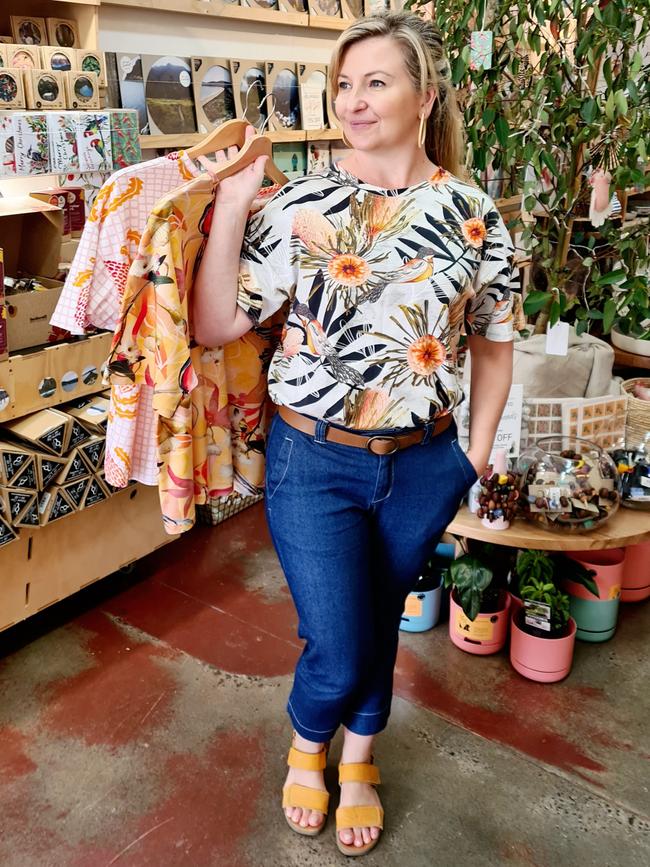
Bannister now has 15 staff, double the number she had before the pandemic.
She says people are keener than ever to shop locally since the pandemic began, and support items made in Tasmania and Australia.
There was a boom in homewares and plants during lockdown as people looked for ways to brighten their surroundings at home. But since restrictions eased and masks are no longer mandatory in most settings, shoppers have turned their attention to sustainable fashion.
“People are wanting a nice outfit or a new pair of shoes – they want to feel fabulous again, after living in trackies and slippers for so long,’’ Bannister says.
She says the key to survival has been building a profile online and offering click and collect and home delivery services, with online sales helping to balance the quiet times in the Hobart shopfront, which trades seven days a week.
She says Christmas trade was fantastic, but sales dropped in January and February, as people stayed home more following our border reopening on December 15.
Bannister believes the rising cost of parking in the CBD is a far greater threat to her business than the pandemic, with customers struggling to get a park and then constantly looking at their watches while shopping in fear of overstaying their time limit and getting a parking ticket.
“In January and February when things dropped off there were moments of ‘gosh, have I made the right decision (in expanding the business over recent months)?’,’’ Bannister says. “But I do believe long term there are ebbs and flows in business and there are highs and lows … we just have to put ourselves in a strong position so we can weather the storms.
“I feel Covid has given us inner strength. There is a degree of optimism that if we can survive a global pandemic we must be strong enough to be able to survive whatever comes next. There’s always something around the corner that small businesses have to survive, but we do it with optimism.’’
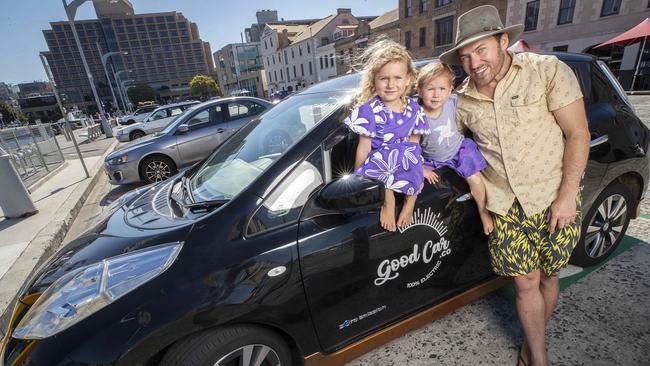
THE GOOD CAR COMPANY
Anthony Broese van Groenou started importing electric cars to Australia not long before the pandemic hit.
“When Covid happened, we thought everyone was going to go quiet,’’ he says. “We thought there would be a massive crash in the economy and everything would grind to a halt.’’
But fortunately for Broese van Groenou and his business partners Anton Vikstrom and Sam Whitehead, the opposite proved true.
While the world went into lockdown, cars – considered an “essential service” – were easier to import and suddenly Australians became far more aware of global instability and more conscious of finding ways to live a more self-sufficient and sustainable lifestyle.
And second-hand electric cars were suddenly in hot demand.
Skyrocketing fuel prices in recent weeks have increased demand even further, with the business currently fielding 400-500 inquiries a week. Extra staff have been employed in the Hobart office to deal with the high level of interest and the business also has a pop-up office in Canberra with NSW also on the radar.
A litre of fuel is currently sitting around $2.30 in Tasmania and allows the average car to travel about 10-12km.
By comparison, Broese van Groenou says if you plugged your electric car battery in to a 10 amp household power point to charge on a standard electricity tariff, it would cost you about $3 to travel 100km. The cars become even cheaper to run if you charge the batteries with solar power.
The enterprising co-founders of the business were motivated to take action in the face of climate change. They initially banded together as part of a local co-op of people wanting to own electric cars, importing them in bulk as a way to reduce costs.
“It definitely wasn’t going to be a business,’’ Broese van Groenou says.
But more and more people wanted cars and a business soon emerged.
The cars initially came from Japan, but now they come from anywhere in the world that has right-hand drive vehicles, including Hong Kong and Singapore. The Good Car Company is now looking to import brand new cars direct from the factory floor to meet demand, in addition to second-hand vehicles of various makes and models.
Hundreds of cars have already been imported to Tasmania, with hundreds more imported for interstate owners.
People are paying between $15,000 and $60,000 for the vehicles, and Broese van Groenou says his customers are not who you might expect. “All the industry reports say young professionals are the first to get electric vehicles,’’ he says.
“But you’d be amazed … the people we see are generally retirees with silver hair – and women.’’
Electric vans are capturing the interest of businesses, while Broese van Groenou expects tradies will be keen once electric utes start coming into the state.
A PhD candidate at the University of Tasmania specialising in energy systems, Broese van Groenou is so confident owners will love their electric cars the business offers a returns policy – only one person has returned their vehicle so far and that was due to becoming unemployed during the pandemic.
Broese van Groenou, a father of two young children, says it’s amazing – and a big relief – to see that all the time and money that has been put into the business is paying off.
“It’s pretty phenomenal,’’ he says. “I totally did fear that it would all fall over. But the pandemic has definitely helped business rather than hindered it.’’
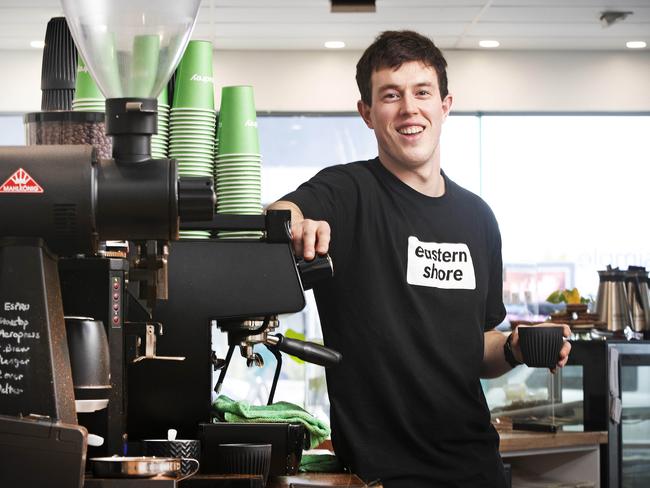
AUDREY COFFEE
Audrey Coffee was still a relatively new venture when Covid hit, but a strong local following and a willingness to adapt ensured the business could continue to trade throughout the pandemic and even embark on an expansion.
The Rosny Park cafe had been open for just over a year when the pandemic kicked off but co-owner Luke Wilcock says a bit of luck, and embracing new ways of servicing customers, had helped the business thrive, with a second cafe – at Rokeby – opening a few months after the pandemic began.
“I think it was a bit of a bold move (to open a second cafe during a pandemic) but it was just an opportunity that really made sense,’’ he says.
“We’ve been so, so lucky this entire time, we’ve been able to keep the doors open to both stores. We did lower our hours ever so slightly. But all staff kept their hours and didn’t need any government assistance which was incredible.’’
The business traded as takeaway-only during lockdown and Wilcock and co-owner Peter Ladyman also focused on expanding existing platforms, such as Audrey’s online store and merchandise line, to help support the business.
A home delivery service also delivers coffee beans across the Eastern Shore for a small fee, enabling people in isolation or those who are wary of public spaces to enjoy their favourite coffee at home.
The delivery service was free throughout January and February this year as a way to say thank you to loyal customers who supported the business during the height of the pandemic.
“We felt like the pandemic had been going for so long and everyone was getting a bit sad and tired of it and after the borders opened in mid-December we just thought we’d give back to the community that supported us so much,’’ Wilcock says. He says Audrey Coffee’s line of merchandise, which includes T-shirts, socks and caps that pay homage to the business and the Eastern Shore more broadly as well as coffee cups and other kitchenware, had attracted quite a following, with the focus on building a brand and a community rather than just serving coffee and cakes.
He says there are no immediate plans to open additional cafes, but that may come down the track.
“We never want to bite off more than we can chew but I guess just watch this space really,’’ Wilcock says.
“It’s a little bit of a grim time still, especially for hospitality. But even still, it’s definitely getting better, you can see the horizon.’’
SURVIVING 2022 AND BEYOND
Grimmer believes that the wider Tasmanian community is keen to support local businesses, so owners and managers need to make this as easy and convenient for customers as possible.
“That means that every business should have a website offering their goods or services for sale,’’ she says.
“Yes, many people still want to shop in physical stores – overwhelmingly so – but we also want convenience, including home delivery, click and collect and just the ability to browse and shop online (often out of business hours).
“During 2020 we saw many small firms either developing new online stores, or vastly improving their online offering, but there are still some businesses that are yet to really embrace this platform. I really believe it is going to be key to surviving whatever the future may throw at the Tasmanian retail industry.’’
Building an online community of followers is also essential moving forward.
“Using social media effectively will also be key for small firms to connect with existing and new customers,’’ she says.
“So digital tools are going to be key.
“The other aspect will be in the product offering and customer service. How can firms differentiate themselves from the competition? By offering consumers products that their competitors do not, and by providing exceptional levels of customer service.’’ •




